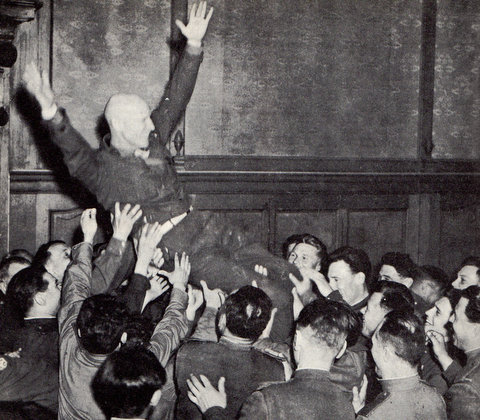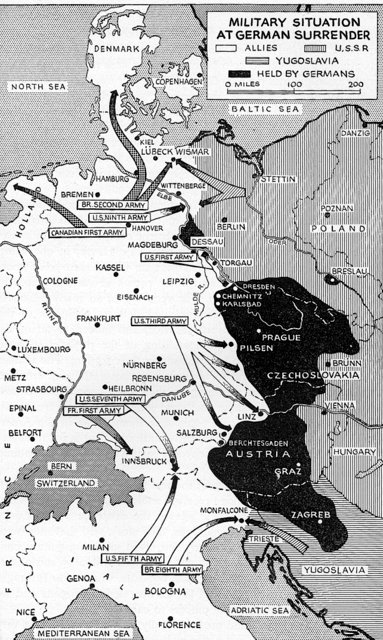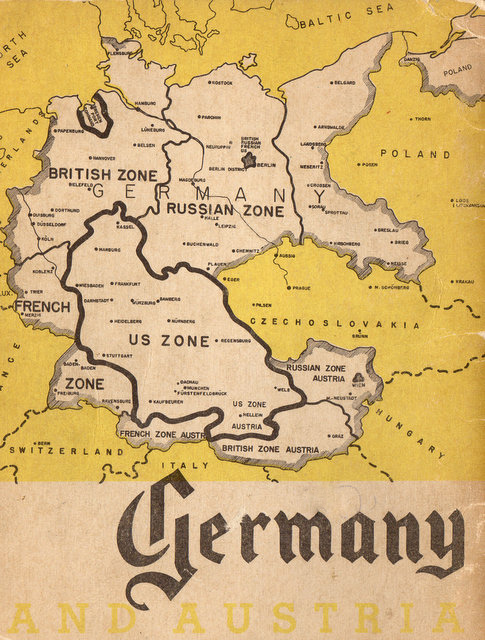Should we have challenged the Russians for Berlin in April, 1945?
Nov 14, 2014 02:07:50 #
This argument has been going on for almost 70 years. Here are some of the facts. Judge for yourself.
Russia felt she earned the right to take Berlin by herself, because the Nazis killed more of her people and ravaged her economy more severely than they had anybody else. Russia wanted revenge, not just reparations and prestige.
In early February, 1943 -- more than a year before our D-Day invasion of France -- the Red Army at Stalingrad captured an entire Nazi army: 91,000 men, including Field Marshal Pauling, 24 generals and 2,500 lower officers, and paraded them through Moscow. The Nazi surge into Russia came to a halt, then began a slow, reluctant ebb back over 1,500 miles toward Berlin, with Hitler screeching "Stand your ground! No withdrawals! Fight to the last man!" Easy for him to say.
On May 1, 1944 -- a month before D-Day -- the retreating Nazis firmed up in Belrussia to counterattack, although outnumbered ten to one by Soviet armor, artillery, air force and infantry. Bad decision. On July 17, 1944, the Russians paraded another 57,000 defeated Nazis through Moscow.
And so it went until the Russians surrounded Berlin in early April, 1945. The day of reckoning had come. But it could not be a joint Allied attack, even though American and British forces were relatively close, with still-hostile Nazi troops sandwiched between them. The language and command differences between the Russians, Americans and British could easily have led to catastrophic battlefield mistakes between the armies. Some Americans and British wanted to beat the Russians to Berlin, going in before them.
On March 28, to the dismay of the British, Supreme Allied Commander Eisenhower notified Stalin of his plan to hold his armies -- American and British -- at the Elbe River (about 35 miles from Berlin) when they got there, which was April 12th. Until April 20th, when a system of "recognition signals" was agreed on, there were occasional skirmishes between Soviet and American air force fighters, with shots fired and "some unfortunate results," according to Eisenhower.
As Supreme Commander, Eisenhower had to make the final decision: compete with the Russians, or deal with other problems this side of their Zone boundaries. In his and Gen. Omar Bradley's analysis, Berlin was a political target, not a military target, and not worth the estimated loss of 100,000 American lives, to say nothing of the fearful prospect of open war with the Russians. The Joint Chiefs of Staff in Washington agreed. The British Joint Chiefs did not.
The British felt disrespected. They claimed the Yalta agreements defining the various Occupation Zone boundaries could be ignored, even though co-signed by Churchill, and we could seize Berlin. The Russians disagreed and openly suspected the Western Allies were plotting to deprive them of their rightful occupation rewards. Would they have militarily opposed an Allied seizure of Berlin? Good question. On April 25, 1945, the American and Russian troops finally made official -- and peaceful -- linkup at the American bridgehead at Torgau on the Elbe River, to the relief of obsevers on both sides.
Meanwhile, Eisenhower activated "Eclipse," the plan for operations in Europe when the Germans collapsed. Gen. Montgomery was assigned to move his 2nd British Army north into Denmark to prevent the Red Army from occupying Denmark. The Soviets reportedly hoped to seize and keep Danish ports which would give them access to year-round ice-free marine traffic. It never happened.
Russia felt she earned the right to take Berlin by herself, because the Nazis killed more of her people and ravaged her economy more severely than they had anybody else. Russia wanted revenge, not just reparations and prestige.
In early February, 1943 -- more than a year before our D-Day invasion of France -- the Red Army at Stalingrad captured an entire Nazi army: 91,000 men, including Field Marshal Pauling, 24 generals and 2,500 lower officers, and paraded them through Moscow. The Nazi surge into Russia came to a halt, then began a slow, reluctant ebb back over 1,500 miles toward Berlin, with Hitler screeching "Stand your ground! No withdrawals! Fight to the last man!" Easy for him to say.
On May 1, 1944 -- a month before D-Day -- the retreating Nazis firmed up in Belrussia to counterattack, although outnumbered ten to one by Soviet armor, artillery, air force and infantry. Bad decision. On July 17, 1944, the Russians paraded another 57,000 defeated Nazis through Moscow.
And so it went until the Russians surrounded Berlin in early April, 1945. The day of reckoning had come. But it could not be a joint Allied attack, even though American and British forces were relatively close, with still-hostile Nazi troops sandwiched between them. The language and command differences between the Russians, Americans and British could easily have led to catastrophic battlefield mistakes between the armies. Some Americans and British wanted to beat the Russians to Berlin, going in before them.
On March 28, to the dismay of the British, Supreme Allied Commander Eisenhower notified Stalin of his plan to hold his armies -- American and British -- at the Elbe River (about 35 miles from Berlin) when they got there, which was April 12th. Until April 20th, when a system of "recognition signals" was agreed on, there were occasional skirmishes between Soviet and American air force fighters, with shots fired and "some unfortunate results," according to Eisenhower.
As Supreme Commander, Eisenhower had to make the final decision: compete with the Russians, or deal with other problems this side of their Zone boundaries. In his and Gen. Omar Bradley's analysis, Berlin was a political target, not a military target, and not worth the estimated loss of 100,000 American lives, to say nothing of the fearful prospect of open war with the Russians. The Joint Chiefs of Staff in Washington agreed. The British Joint Chiefs did not.
The British felt disrespected. They claimed the Yalta agreements defining the various Occupation Zone boundaries could be ignored, even though co-signed by Churchill, and we could seize Berlin. The Russians disagreed and openly suspected the Western Allies were plotting to deprive them of their rightful occupation rewards. Would they have militarily opposed an Allied seizure of Berlin? Good question. On April 25, 1945, the American and Russian troops finally made official -- and peaceful -- linkup at the American bridgehead at Torgau on the Elbe River, to the relief of obsevers on both sides.
Meanwhile, Eisenhower activated "Eclipse," the plan for operations in Europe when the Germans collapsed. Gen. Montgomery was assigned to move his 2nd British Army north into Denmark to prevent the Red Army from occupying Denmark. The Soviets reportedly hoped to seize and keep Danish ports which would give them access to year-round ice-free marine traffic. It never happened.
Celebrating the first Soviet-U.S. meeting, Russians toss Gen. William Simpson at banquet - April 25, 1945

Note British army thrust into Denmark, to prevent Soviet invasion - 1945

The four Occupation Zones agreed on at Yalta Conference, Feb. 1945

Nov 14, 2014 03:43:05 #
RichardQ wrote:
This argument has been going on for almost 70 year... (show quote)
I'd say no. But from what I understand General Patton had wanted to fight the Russians even before that point. Not sure why you posted this. It is far removed from photography. Though interesting as it expands on a part of history I was not fully so aware of. I've been more interested in the Japanese - American portion of WWII. Several reasons for that. Wow, you know what the big controversial questions are there? Actually two in my mind. One at the beginning and one at the end. I am not suggesting an actual discussion here.
Nov 14, 2014 07:17:21 #
Nov 14, 2014 08:16:04 #
The map of post war Germany had already been drawn at Yalta, placing Berlin well within the Russian zone. Any ground we would have taken would have been returned to the Soviets. Not worth the casualties.
Nov 14, 2014 09:45:12 #
Interesting topic. The world would surely be a different place if we had but the American public at that point were in no mood for another fight. & the US was trying to win the war in the Pacific before russia landed troops in Japan.
Nov 14, 2014 10:00:32 #
donrent wrote:
Sixty-four years later, why is this even a topic for discussion ???
Thanks for your interest and comment, donrent. This post is one of a series I began around April, when I posted some photos I took in Europe a a GI in the occupation of Germany. To my surprise, I got a lot of requests for more of the same, especially asking for explanatory narratives with them. The number of viewings has reached more than 4,000 on some of the posts, and many have added, "Keep 'em coming." It seems there hasn't been much taught about the occupation of Germany, and people have become curious about it. I was in Troop Information & Education in the AAF so I can write with some detail about those events. They continue to affect our lives today (Putin was an NKVD agent in East Germany for some years before he returned to Mother Russia, still carrying the feeling that the West is Russia's enemy).
Nov 14, 2014 10:14:27 #
lamiaceae wrote:
I'd say no. But from what I understand General Pa... (show quote)
Thank you for your comments, lamiaceae. My post is one of a series dealing with the military occupation of Germany, 1945-1949, in which I took part. It started when I posted a few of my photos from that period, together with some narrative, and to my surprise people asked for more. The viewers range from other vets (U.S. and British) as well as folks born after the war who wanted to learn more o what their parents experienced. Some of my posts have registered more than 4,000 viewings, so there is interest out there. Concerning responding to the question posed by this post, I feel Eisenhower did the right thing. We had a cold war and a lot of tension between East and West, but we avoided a hot war which would have included nukes.
Nov 14, 2014 10:20:40 #
nakkh wrote:
Interesting topic. The world would surely be a different place if we had but the American public at that point were in no mood for another fight. & the US was trying to win the war in the Pacific before russia landed troops in Japan.
Thanks for your interest and comments, nakkh.
Eisenhower had Gen. MacArthur's Pacific war on his mind while making these decisions, since both of them felt the European Theater was winding down and were planning major transfers of ETO troops to the Pacific. Of course, neither general knew about the atom bomb, which at that point hadn't been tested.
Nov 14, 2014 10:52:01 #
donrent wrote:
Sixty-four years later, why is this even a topic for discussion ???
Because someone is thinking of the question. Maybe to re-write history?
Sarge69
Nov 14, 2014 11:16:56 #
donrent wrote:
Sixty-four years later, why is this even a topic for discussion ???
Do you ever wake up on the sunny side of the bed? Have you ever talked about history outside of any school classes you may have had?
Some of us enjoy these interesting posts that you obviously don't...so don't open them and get your panty's in a wad!
Nov 14, 2014 12:42:57 #
Nov 14, 2014 13:56:23 #
Interesting. Thanks for posting.
RichardQ wrote:
Thanks for your interest and comments, nakkh.
Eisenhower had Gen. MacArthur's Pacific war on his mind while making these decisions, since both of them felt the European Theater was winding down and were planning major transfers of ETO troops to the Pacific. Of course, neither general knew about the atom bomb, which at that point hadn't been tested.
Eisenhower had Gen. MacArthur's Pacific war on his mind while making these decisions, since both of them felt the European Theater was winding down and were planning major transfers of ETO troops to the Pacific. Of course, neither general knew about the atom bomb, which at that point hadn't been tested.
Nov 14, 2014 15:45:59 #
I, too, served in Germany during the Occupation, joining General Patton's military group before it became the Constabulary. The Berlin Airlift, caused by Russia for no good reason, other than brutal retaliation against the German citizens, caused numerous Allied Air Forces deaths. The Russian Zone of Occupation was shut to all, so the Allied forces had to fly in needed food supplies and other needed supplies to keep the German citizens from starving and|or freezing to death in the brutal winter weather.
American General George S. Patton was right. British and American troops should have continued into Berlin, denying the historically brutal and murderous Russians any rights to Berlin.
American General George S. Patton was right. British and American troops should have continued into Berlin, denying the historically brutal and murderous Russians any rights to Berlin.
Nov 15, 2014 06:30:35 #
Thanks for the history lesson Richard. I am not sure Patton was correct, but for sure history would have been changed.
Nov 15, 2014 06:58:28 #
If you are interested in this topic I suggest the best seller "Killing Patton". It covers this topic very well.
If you want to reply, then register here. Registration is free and your account is created instantly, so you can post right away.








